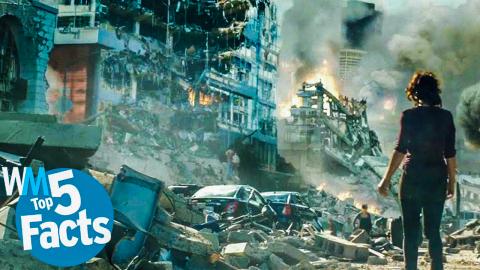Top 5 DESTRUCTIVE Facts About Earthquakes

Hollywood's depiction of an earthquake varies from the overly dramatic to the downright silly. Thankfully, we're here to set the record straight when it comes to planet earth's most notorious rumblings.
Special thanks to our users mac121mr0, Daniel Fong and AnsemtheWise93 for submitting the idea on our interactive suggestion tool: WatchMojo.comsuggest
Top 5 Facts About Earthquakes
Hollywood’s depiction of an earthquake varies from the overly dramatic to the downright silly. Thankfully, we’re here to set the record straight when it comes to planet earth’s most notorious rumblings.
Welcome to WatchMojo’s Top 5 Facts. In this installment, we’re counting down the Top 5 Facts About Earthquakes.
#5: You Don't Feel Most Earthquakes
If someone were to tell you that the Earth experiences several million earthquakes per year, you’d probably wonder why all major cities don’t look like Metropolis at the end of “Man of Steel”. However, the vast majority of these quakes are so small you can’t even feel them. The media tends to focus on the few bad apples that cause significant damage, but of the hundreds of thousands of tectonic shifts that transpire throughout the year, only a 100 or so of the worst offenders make the news.
#4: “Icequakes” & “Moonquakes” Exist
While they may sound like some sort of dance your father swears was big in the 70s, these two unique phenomena have been known to occur in their respective regions. Primarily striking within the interior of Antarctica, an icequake, also known as a cryoseism, is quite similar to its earthy brethren; however they happen in sheets of ice rather than in ground below. Moonquakes are – you guessed it – quakes on the moon. They are considerably weaker and occur less frequently than those earthside, and strike more or less in the middle of the moon's interior. On the bright side, property damage and loss of life are highly unlikely when either of these two unusual quakes occur.
#3: The "Ring of Fire" Produces the Most Earthquakes in the World
Shaped more like a horseshoe than a ring, this ominously named location is home to 90% of all quakes on earth. Traversing the boundaries of the Pacific Ocean, the aptly named ring covers a distance of roughly 25,000 miles– making contact with North and South America, Asia and Oceania. The reason that this particular region is so saturated with seismic activity is simple: more than eight different tectonic plates are constantly bumping, crashing and colliding with each other within its boundaries. The result is an area that produces 81% of the world’s largest earthquakes – that’s a lot of moving and shaking. Makes you feel pretty bad for the Man in Black.
#2: Earthquakes Can "Turn Water into Gold"
Who doesn’t? According to a study in the scientific journal Nature Geoscience, earthquakes vaporize water in faults, leaving behind all that sweet, sweet gold. Well... sort of. What's mostly in the water is carbon dioxide, but it also contains silica and other elements, including gold. This virgin Goldschlager remains hidden until the pressure from an earthquake causes the fault fractures to open and out comes the treasure. Unfortunately, for those without access to high-powered excavation tools, the gold will remain hidden underground. So maybe it’s time you joined that local team of miners who always seem so chipper.
#1: A Massive Earthquake May Have Shortened the Length of a Day on Earth
We all know mother earth is a powerful lady. But did you know she has the ability to alter time? That’s right. After a gigantic 8.8 magnitude earthquake struck Chile, scientists quickly deduced a pair of usual facts: 1) the town of Concepción had been moved 10 feet to the west, and 2) the Earth's rotation had undergone a dramatic change. You see, by slightly altering the earth’s rotation, the length of a day on our blue planet was shortened by 1.26 microseconds. While a microsecond is only one-millionth of a second long, it still counts. So if you start to feel like the days are getting shorter, you can shake your fist at the ground and blame it on the quake.


 1
1
 0
0
 flagged
flagged

 0
0
 1
1
 flagged
flagged